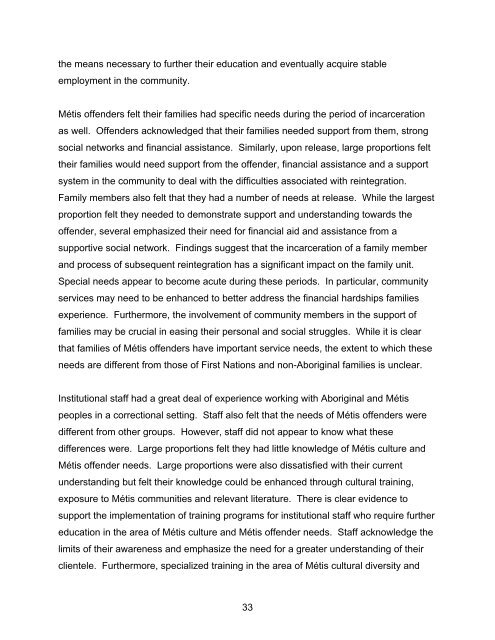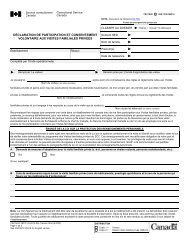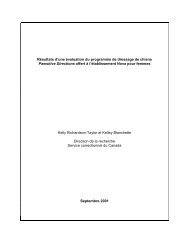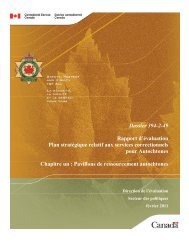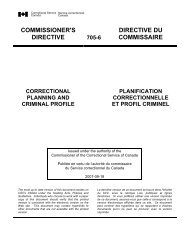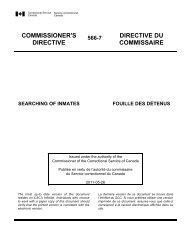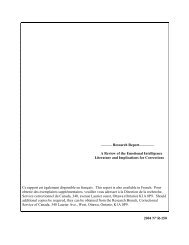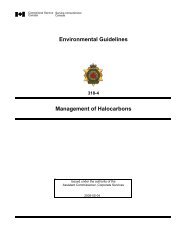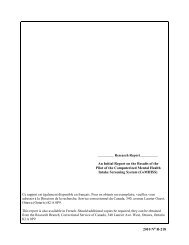Program and Service Needs of Federally Incarcerated Métis ...
Program and Service Needs of Federally Incarcerated Métis ...
Program and Service Needs of Federally Incarcerated Métis ...
Create successful ePaper yourself
Turn your PDF publications into a flip-book with our unique Google optimized e-Paper software.
the means necessary to further their education <strong>and</strong> eventually acquire stable<br />
employment in the community.<br />
<strong>Métis</strong> <strong>of</strong>fenders felt their families had specific needs during the period <strong>of</strong> incarceration<br />
as well. Offenders acknowledged that their families needed support from them, strong<br />
social networks <strong>and</strong> financial assistance. Similarly, upon release, large proportions felt<br />
their families would need support from the <strong>of</strong>fender, financial assistance <strong>and</strong> a support<br />
system in the community to deal with the difficulties associated with reintegration.<br />
Family members also felt that they had a number <strong>of</strong> needs at release. While the largest<br />
proportion felt they needed to demonstrate support <strong>and</strong> underst<strong>and</strong>ing towards the<br />
<strong>of</strong>fender, several emphasized their need for financial aid <strong>and</strong> assistance from a<br />
supportive social network. Findings suggest that the incarceration <strong>of</strong> a family member<br />
<strong>and</strong> process <strong>of</strong> subsequent reintegration has a significant impact on the family unit.<br />
Special needs appear to become acute during these periods. In particular, community<br />
services may need to be enhanced to better address the financial hardships families<br />
experience. Furthermore, the involvement <strong>of</strong> community members in the support <strong>of</strong><br />
families may be crucial in easing their personal <strong>and</strong> social struggles. While it is clear<br />
that families <strong>of</strong> <strong>Métis</strong> <strong>of</strong>fenders have important service needs, the extent to which these<br />
needs are different from those <strong>of</strong> First Nations <strong>and</strong> non-Aboriginal families is unclear.<br />
Institutional staff had a great deal <strong>of</strong> experience working with Aboriginal <strong>and</strong> <strong>Métis</strong><br />
peoples in a correctional setting. Staff also felt that the needs <strong>of</strong> <strong>Métis</strong> <strong>of</strong>fenders were<br />
different from other groups. However, staff did not appear to know what these<br />
differences were. Large proportions felt they had little knowledge <strong>of</strong> <strong>Métis</strong> culture <strong>and</strong><br />
<strong>Métis</strong> <strong>of</strong>fender needs. Large proportions were also dissatisfied with their current<br />
underst<strong>and</strong>ing but felt their knowledge could be enhanced through cultural training,<br />
exposure to <strong>Métis</strong> communities <strong>and</strong> relevant literature. There is clear evidence to<br />
support the implementation <strong>of</strong> training programs for institutional staff who require further<br />
education in the area <strong>of</strong> <strong>Métis</strong> culture <strong>and</strong> <strong>Métis</strong> <strong>of</strong>fender needs. Staff acknowledge the<br />
limits <strong>of</strong> their awareness <strong>and</strong> emphasize the need for a greater underst<strong>and</strong>ing <strong>of</strong> their<br />
clientele. Furthermore, specialized training in the area <strong>of</strong> <strong>Métis</strong> cultural diversity <strong>and</strong><br />
33


